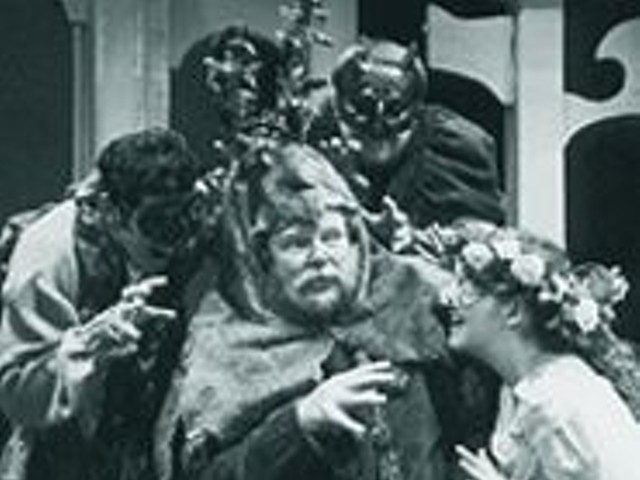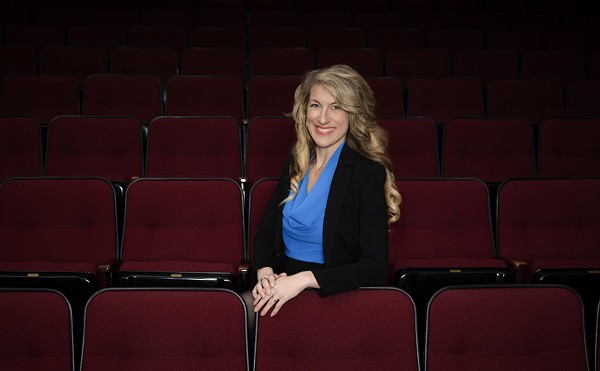Centro, for those who remain uninitiated, is a collective of do-it-yourselfers that provides a venue for music, visual art and theater in an unassuming square brick building behind local landmark Hanneke Hardware, on the edge of a residential district with nicely trimmed yards and Blessed Virgin statues. A good rule for any artist is to work with what's available, and Centro is what young, motivated, adventurous, inexperienced artists without the stamp of legitimacy have as a resource -- a resource that offers its own bag of artistic challenges, at times, such as tonight: The electricity bill didn't get paid, so Guv'Ment Cheez must figure out how to rehearse in the dark. Hence those sheepish looks.
In the meantime, with the front door open, there's still enough sunlight coming into the space for the group to sit around and talk about their upcoming production, Four Corners, an evening of unrelated one-acts written and directed by members of the company. There's also enough light to take a look at their handiwork: a two-level stage, a bank of lights (although inoperable for now) -- all constructed by the company after working their day jobs, with hammering sessions often going until 3 in the morning. With a combination of donated materials and free labor (Guv'Ment Cheezer Derek Simmons remembers one night when a drunk from a nearby bar came in and lent a hand), the Centro theater space was built for about 500 bucks. They've managed to make that money back with two previous productions, with enough left over for a party.
Their let's-put-on-a-show spirit was sparked by Robin Garrels, who had recently returned home from LA, where her play Supernatural Moralities premiered at a Hollywood space called the Jewel Box. "It was dark comedy, a noir-type story." she says. Because she "had a drive to do it again," she started calling up friends, including fellow alums from Metro High -- proof that the where-you-went-to-high-school creed remains a significant way to get things done in St. Louis. A friend of a friend connected her with Centro, which was very much open to the idea of supporting live theater. The play came together and was performed for appreciative audiences, appreciative enough to pay the construction bills and have that party, and to try again with another show.
Small fledgling theater groups have a habit of disintegrating as a result of dueling personalities -- not unlike fledgling rock bands -- but the members of Guv'Ment Cheez remained resilient and affable and interested enough to work together again. Garrels directed Christopher Durang's Beyond Therapy, which was performed at Centro over the Memorial Day weekend. They performed for free because they hadn't been able to acquire the rights to the comedy, but either because the price was right or because of the quality of the performance, they played to full houses on the closing nights.
Now comes Four Corners, highlighting the writing abilities within the company. A productive group they are, too. "We have enough scripts to last a whole year," says Garrels.
Benjamin Gaa describes his one-act, "Sleepy Time; Early In," as "a play about a moment between a young couple, early into a relationship, just after sex." Scott Dorough's "A Lecture on Jazz and How to Keep Aliens from Stealing You" is less romantically inclined, although it begins with a failed relationship: A wife leaves her husband, and his coping mechanism involves a theory about alien abduction and jazz music. "It's full of stop-action and narration, like a Scorsese movie, except it doesn't end in a bloodbath," says Dorough. Carlos Santana makes a cameo appearance and supplies a "symbolic reference."
Robert Strasser says his "Ergo Ego" is the "trippiest of them all," and, as with the company itself, it's freshly formed. Asked how many characters are in the cast, Strasser pauses: "Seven?" he asks himself. "I just wrote it." Strasser's play takes place during one night in a small dance club, an evening in which "the characters are at flux in their lives, and each has a different type of revelation." The participants include a giant swan, a rabbit named Chicken and a musician who wants to be a magician.
The most ornate, and picaresque, of Four Corners' plays is by Robin Garrels' father, Dennis; it's a medieval romance written in rhyming couplets called "La Vita Nuova." "It starts out in the northern territory of Europe," says Garrels père, "and has a couple wind their way to Byzantium. A loving couple, they head out to find adventure and fun, from Russia to Prussia to Hungary to Transylvania to Byzantium. The first scene is a love scene, and we use medieval music."
"It's not a love scene," someone interrupts Dennis, midnarrative.
"A scene about love," he corrects himself. He goes on describing swordplay; dancing; an encounter with Vlok, the great-great grandfather of Vlad the Impaler; alchemists who've gone over to the dark side; an early attempt at blood transfusion; a Wagnerian death scene; and an encounter with an old hermit in Constantinople.
Isn't Garrels making considerable demands on such a limited space? "We're paring it down," he says.
It's getting dark, so the company must come to an agreement on what to do about rehearsal. A number of alternatives are suggested: The elder Garrels has peeked into a couple of nearby bars to see whether Guv'Ment Cheez could invade without bothering anybody. Tower Grove Park is considered, but there's a concern about mosquitoes. Derek Simmons offers his house on the North Side, and the Garrels offer theirs, which is closer, in South City.
These negotiations continue outside on the corner as the company waits for three members who are now exceedingly late. Actors Equity this is not, as the Guv'Ment Cheezers wait and talk and smoke and hang out with the unruffled patience of the young.
The three arrive, which means more discussions about where to move the rehearsal, but by sunset a caravan is on its way to South City and the Garrels' house.
At least they've paid their electric bill, but there's not much room in which to perform. Someone has the good judgment to decide not to use the swords tonight. Strasser decides to begin with his play, because it's the most "crunchable" in the small dining-room area. A comment is made about how in Poland during the Solidarity movement and the time of martial law, theater artists performed their works in people's living rooms because the theaters were closed to them. "Communism drove art into their homes," Simmons observes. "Capitalism drives it into ours."
Strasser takes the stage with the opening line of his play, "Hello Cleveland!," which is a pretty good start. What follows is a sitcomlike series of events about couples getting together or not getting together, with the best scenes involving Simmons as the musician who wants to be a magician. For this rehearsal, the 6-foot swan must be imagined, although it precipitates the best directorial note of the evening, when Strasser instructs Clara Moore that her character "would never say 'fucking' and 'swan' together."
The Guv'Ment Cheezers are amateurs, for sure, with actors falling in and out of character or never even getting to a state of performance that could be called character. The ultimate scene of "Ergo Ego" is dissolved when the doorbell rings and pizza is delivered.
There's promise here, however. Simmons does some effective ad-libbing; Dorough's "A Lecture on Jazz ..." contains some lovely lyrical passages, although these dramatists are still working to get a handle on what makes a scene dramatic.
But they are working at it, and for now have been granted the space and have granted themselves the time to see how far they can go. They have all they need for failure and then, with a little more ferocity of will, can find what they need to succeed.
Art takes just that combination of effort, space, time -- at least that much. And then the ambition to find out what more it takes, and gives.





